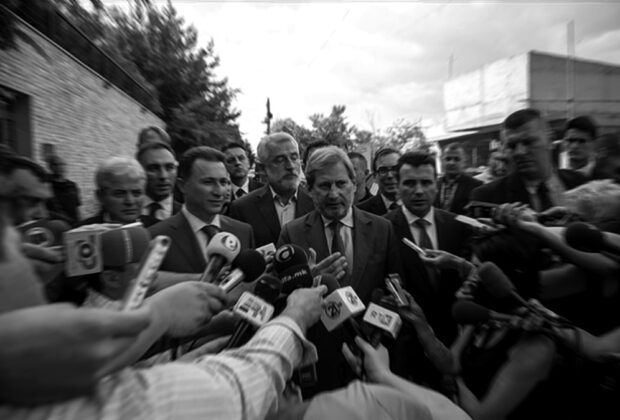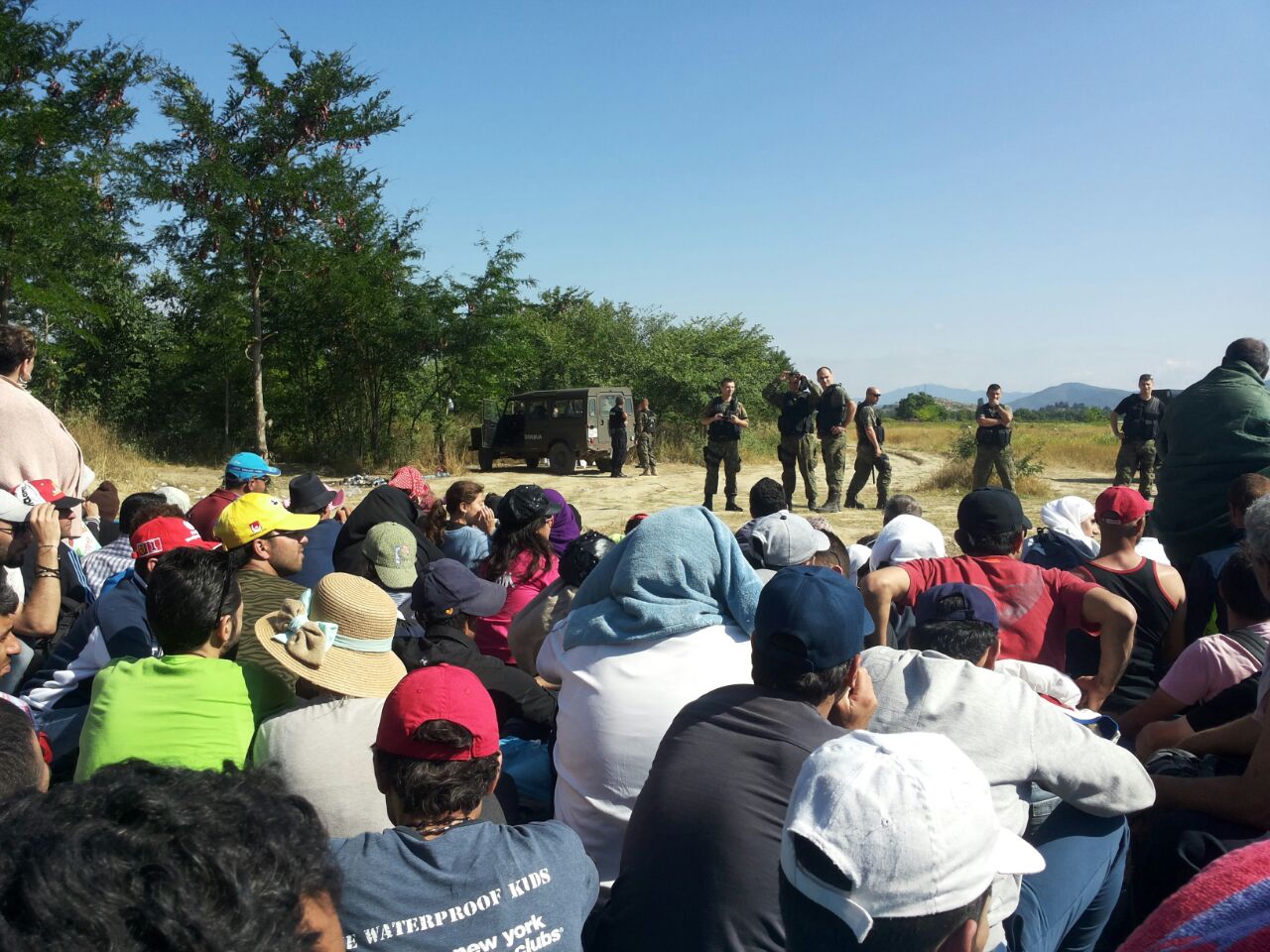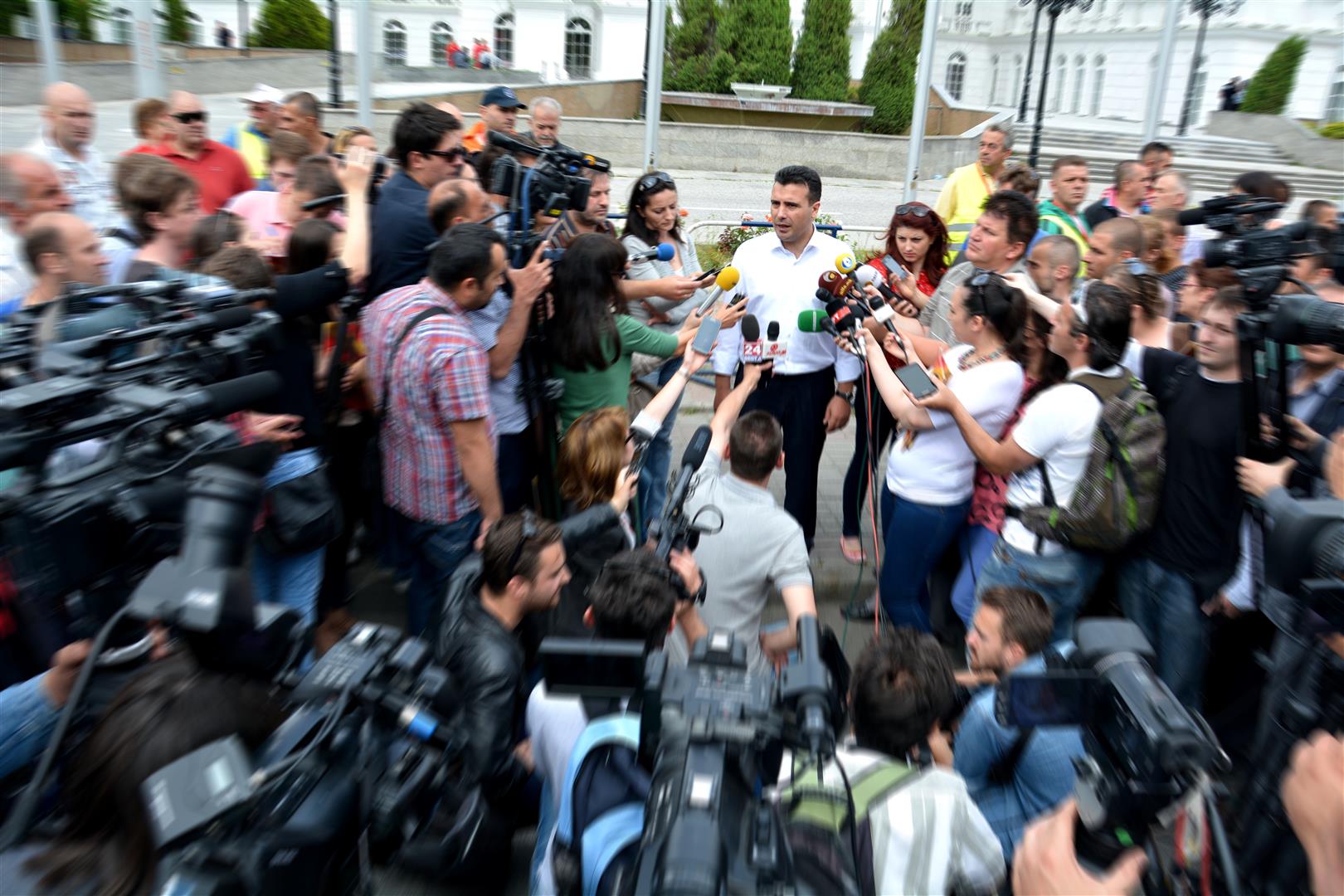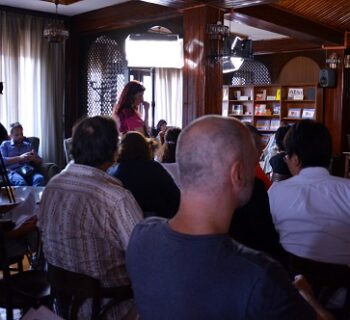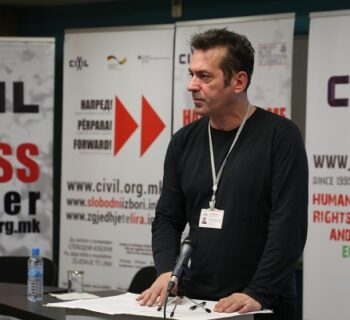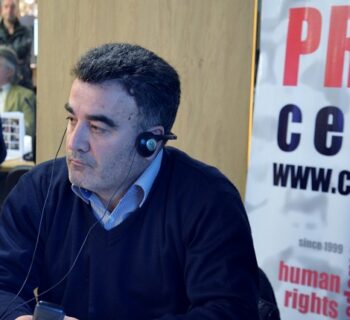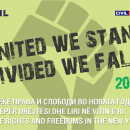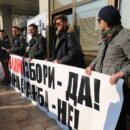[Comments and recommendations]
The political crisis in the Republic of Macedonia is deepening, in spite of the negotiations efforts, facilitated by the international community. The ruling figures in the country have already displayed their unwillingness to substantial and honest participation to this difficult process and to take responsibility for the massive abuse of power and criminal conduct. The negotiations and agreements brokered by the international representatives are bluntly confronted by a set of bogus actions by the government, increased populism and an intensified media offensive of the Prime Minister Gruevski and his associates.
Following the development of the political situation in the country, a team of CIVIL – Center for Freedom was working on summing up the opinions, recommendations, analysis and demands of the various political entities, civil society organizations and of the experts that have been consulted by the team in the past several weeks. Their contributions are publicized on the website of CIVIL, also published or quoted by the few remaining independent media in the country. Previously, CIVIL’s team prepared and publicized several recommendations on June 9, based on the analysis prepared within the organization.
In continuation of these activities, we present these comments and recommendations based on the political agreement from June 2, 2015 in hopes that this will help the process to become truthful and to contribute to restoration of democracy, rule of law and respect for human rights in the country.
1. The agreement of June 2 prescribes return of the opposition SDSM to the Parliament. According to that, SDSM would be in charge of the parliamentary inquiry commission on the wiretapping scandal. Commissions on the intervention in communications would also be managed by the SDSM and begin an investigation on the failures of the security and counterintelligence directorate (UBK – Macedonian abbreviation). Here are the comments and recommendations on this point of the agreement:
a) The false cooperativeness of the ruling party on this point has become obvious already by designing a parliamentary commission on the conduct of the UBK on June 25, where the only three former SDSM members of the parliament took formal positions. This parliamentary body now is a weak surrogate of what is agreed and does not have essential connection to the negotiation process.
b) We expect that the inquiry commissions within the parliament should provide true functionality and independence.
c) Firm guarantees are necessary for independent and uninfluenced operation and access to all information, documents and archives of the Ministry of Interior, UBK, Agency for Electronic Communications (AEK), and all other institutions that are relevant to the investigation, as well as other locations, if the need arises.
d) The level of relevance of the measures and the material needed for the investigation should be determined by the opposition.
e) Yet, the question remains: how much of the archives and information is destroyed or hidden so far? This means that we cannot expect a relevant and correct process to take place, having in mind the experience with the previous conduct of the government.
f) Furthermore, it is important to constitute commission in which VMRO-DPMNE, DUI, DPA and their coalition partners together will not make up the majority of any of the Commissions.
g) Factual findings of the Commissions should have prompt legal conclusions. There should be a special judicial body (court) which will act upon the facts, conclusions and reports. This legal body should be composed by international legal experts (International Court of Justice, etc.), elected in cooperation with the group of EC experts, led by Reinhard Priebe.
h) The Commissions established within the parliament should include experts from the civil society and foreign experts.
i) The ruling parties should refrain from media actions aimed at discrediting the work of the Commissions.
2. Regarding the point that the first report of the Commissions will be drafted in November 2015, we propose the following:
a) Commissions should start with operation only after the return of the opposition to the parliament.
b) Commissions should be obliged to submit interim progress reports, to intensively work in order to provide a detailed report latest by end of October, 2015.
3. The agreement’s point that there will be no further publication of any wiretapped material, we urge the following:
a) SDSM has promised and has an obligation to the public to publish all the material that it has in possession.
b) SDSM may consider discontinuation of the publication of the wiretapped conversations in case of resignation of the whole government.
c) All officials in the country that enjoy immunity or any form of impunity should drop it.
4. The EU will facilitate inter-party dialogue (open to all parties represented in Parliament) to reach agreements on issues of structural reforms in the middle of June and the end of August 2015.
We reiterate our demands that this whole process should include representatives of civil society or VMRO-DPMNE, DUI and DPA together should be represented only by one representative.
5. Reforms to be undertaken in the field of Chapters 23 and 24.
This is an essential article of the agreement and has to be treated accordingly. Based on this, we urge the authorities and political parties to take honest, decisive and urgent measures towards implementation of these requirements.
a) Election of a new Public Prosecutor and urgent reforms of the Public Prosecutor's Office by the end of August. This is the most important and urgent measure that will provide minimum conditions for democratization of this country.
b) Reforms in the judicial system have to start immediately. The first and most urgent step is to select new chairpersons of all courts in the country.
c) Urgent investigation of the security crisis in Kumanovo May 9, 2015.
d) Urgent start of investigation upon the contents of the wiretapped conversations.
6. The parties agreed to implement all the recommendations developed by the European Commission in connection with the systemic issues of the rule of law.
a) In order to reach effective changes within the system and the rule of law, we demand an unconditional and immediate implementation following the report of the expert group of the European Commission led by Reinhard Priebe.
b) The report of the expert group of the European Commission led by Reinhard Priebe is the basis for negotiations on 29 June and for every future step.
7. The composition of the State Election Commission (SEC) will be revised and modified by July 31, 2015. By September 30, 2015, the SEC will be given increased powers to ensure free and fair elections. All OSCE/ODIHR recommendations will be applied, including revision of the Voters Register.
CIVIL has issued numerous recommendations based on electoral monitoring and analysis since 2009. In this respect, we have urged the government to reform and improve the authority and conduct of the SEC on many occasions, including the most recent period.
a) SEC reform: the SEC should be composed of national and international experts, and representatives of civil society, not by party representatives. This measure is essential in order to make this body free from influence by any political party. Members of the SEC in the following period of stabilization and democratization of the country should be selected by the international team of experts.
b) Revision of the Voters Register: This is a duty and responsibility of the SEC, which the Interior Ministry, registry offices, courts, the Agency for Statistics and other relevant data sources, must cooperate fully and to be at its disposal.
c) The revision of Voters Register should be conducted under supervision of a strong independent body composed of civil society and national and international experts to inspect the work of the SEC and all other institutions involved in this operation. A special team composed from the civil society in order to conduct field verification operations should be established.
d) The idea of voters’ registration is problematic having in mind the country’s political and institutional context.
e) Reform of the electoral system: These reforms include a number of changes, such as Macedonia to become one electoral district, as well as introduction of open lists.
f) Termination of the vote in the diaspora which proved to give room to complete and easy manipulation by the ruling party of VMRO-DPMNE.
g) URGENT: VMRO-DPMNE has to immediately stop the campaign which contain explosive and populist elements, and has a highly corruptive character in an electoral context. In other words, the ruling party continues with the massive misuse of public resources for the political and private purposes of its party strongmen.
In conclusion of this document, CIVIL reiterates the comments and recommendations that have derived from its activities, public discussions, statements and analysis in the past several weeks by independent analysts and experts, political figures, civil society and other relevant stakeholders.
1. Reportedly, ruling parties have agreed or insisted on several other conditions. One of these conditions is the withdrawal of PM Gruevski three months before the election.
Comment: This condition is unacceptable. The whole rule of Gruevski and his government speaks against this condition. We are firmly convinced that his way of ruling will not change and that his participation in the government would only be destructive.
2. Reform of the public broadcasting service, MRTV.
Comment: Only by reforming the public broadcasting service, MRTV, the effect will be minimal, because corruptive practices in relation to other media in the country whose impact is much greater will remain.
Therefore, the opposition in cooperation with independent experts should take the control of the Agency for audio and audiovisual media services (AVMS) and the Agency for Electronic Communications (AEC).
3. Government composed of ministers and ministers-supervisors of the ruling and opposition parties.
Comment: Such a government will not be functional. The ruling parties will endlessly block decisions and will obstruct the processes that the government should lead.
All corruptive and populist measures that will not be adopted by the transitional government, will be declared as obstacles posed by the "treacherous opposition" and "foreign secret services".
Instead, an expert government is needed, formed under a decisive influence and monitoring of the international community and civil society organizations.
Final recommendation: Early parliamentary, presidential and local elections.
CIVIL - Center for Freedom reiterates its demands for early presidential and local elections in 2016, simultaneously with the early parliamentary elections.
This statement is based on long-term monitoring of our organization and the conclusions reached in the reports of elections in 2013 and 2014, as well as from other reports and analysis and public demands by governmental and other relevant organizations and institutions at national and international level.
This post is also available in: Macedonian
 Македонски
Македонски Shqip
Shqip English
English
